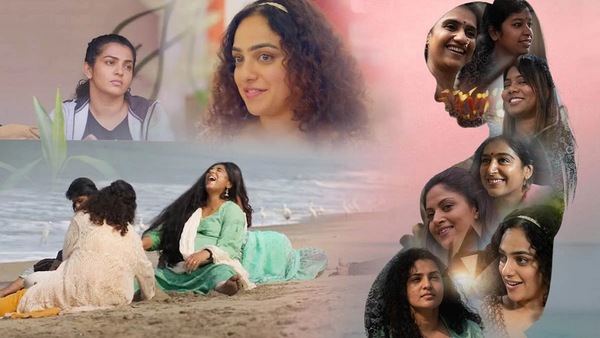Wonder Women review: Anjali Menon’s ode to motherhood is poignant and entertaining
Beneath the veneer of motherhood, the film is a tale of self-discovery that also explores the lingual diversity of the country

Last Updated: 11.59 PM, Nov 17, 2022
Story:
A group of five women, from diverse socio-economic backgrounds, enrol in a pre-natal centre, Sumana, founded by Nanditha (Nadhiya Moidu) and re-discover themselves as they explore motherhood collectively. Their challenges are unique, there are cultural, lingual and attitudinal differences and yet they forge a bond that liberates them.
Review:
Beyond the wide array of subjects that director Anjali Menon dabbles with, hope and companionship are the themes that bind her works together. Life, despite its peculiarities, feels tolerable through her stories. While all her films offer an intimate look at relationships, Wonder Women hits closer to home because it comes from an immensely personal space. There is effortlessness in the narration and it turns out to be a refreshing, affecting experience that leaves the viewer enriched and entertained.
The pivotal characters in Wonder Women capture the spirit of a woman who’s today, independent and has a voice of her own. Diversity in characterisation has always been Anjali Menon’s forte and she gives all her characters enough space to breathe and find their purpose. The challenge is different with Wonder Women, given she has to deal with nearly seven principal characters in a barely 80-minute narrative. Yet, she emerges triumphant.
The worlds of the characters are established well and there’s an air of mystery around them too. Nora wants to chase her dreams and yet prioritises motherhood over them. Mini is yet to come to terms with the wounds of her traumatic marriage while Saya realises the journey towards motherhood is not a bed of roses. Jaya, after three miscarriages, approaches motherhood with an element of caution and Veni expects more support from her partner. Gracy’s excited but also worried if they’ve enough in their kitty to take care of her second child.
The craftiness of Wonder Women comes to the fore in the silences – be it the sequence when Mini munches on her food hurriedly in an eatery or Norah imagines her future while passing through a café or Saya staring into the abyss in a church for introspection. Of course, there are other easily digestible segments too, say the inevitable mother-in-law – daughter-in-law clash (that gets a progressive twist) or the petty fights between the women and their partners.
Another instance of the terrific minimalistic writing is a sequence where Nanditha asks the women and their partners to imagine their future child through a doll and gets them to open up without judging one another. The drama is largely preserved for the climax and it unfolds in a typical Menon-esque style.
There’s a massy ‘woman standing up for a woman’ moment amidst a verbal banter at a hospital and barring its predictability, it’s enjoyable. The film offers a sense of closure for Nanditha (the pre-natal centre founder) too. The best part of Wonder Women isn’t solely the viewing experience but how it makes you feel long after it’s over – a lost art in the era of instantly gratifying larger-than-life fantasies and actioners.
There has been a lot of debate around the idea of English being used as a primary mode of communication in Indian cinema and Wonder Women shows how it’s done while celebrating the lingual diversity of the country. It’s brave of Anjali Menon to discuss the elephant in the room with the very first sequence – the Hindi imposition and the idea of a ‘national language’.
It’s the debate on language that serves as an ice-breaker for women. While Anjali Menon’s Bangalore Days, despite being a Malayalam film, explored lingual diversity in flashes – offering us a mishmash of Tamil, Kannada, Hindi– the digital medium gives her the license to go full throttle. It’s beautiful to see a film that celebrates oneness and respects our differences at once.
Nithya Menen, Padmapriya and Amruta Subhash get roles with instantly relatable conflicts and it shows they have a blast while bringing them to life. However, Parvathy and Sayonara Philip get the more challenging parts and they respond to them with conviction. Parvathy communicates her trauma quite effectively through her body language and long stares.
Nadhiya is at last freed from the stereotype of being a protagonist’s mother, wife or mother-in-law and she relishes that space to the fullest. Archana Padmini as Gracy lends a rooted charm to her part. Manesh Madhavan’s frames express the intent behind the sequences with clarity and his artistry is always to take the story forward and not merely gloss over the scenic backdrops. The pitch of Govind Vasantha’s music fits into Anjali Menon’s world seamlessly.
The soul of Wonder Women is communicated beautifully in Nadhiya’s lines ‘Isn’t it beautiful that all you women will experience similar milestones together - not only of your children but yours too?’ And you sense the possibility of a sequel right there, set in the later decade, where the women come together for a reunion (in Goa?) That’s a film we wouldn’t mind watching too.
Review:
Wonder Women is a light-hearted, poignant take on motherhood, sisterhood and the cultural diversity of the country. While the stellar star cast and their befitting performances are good reasons for you to watch it, this is an out-and-out (director) Anjali Menon show. Pregnancy can always be a melodramatic, preachy territory in cinema but the film is a welcome exception.
Subscribe to our newsletter for top content, delivered fast.

